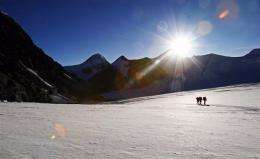'Super Sherpa' climbs to clean up Everest

Apa Sherpa has stood on top of the world more times than anyone in history, and now he is heading back up Mount Everest, not for the fame or glory, but in the name of environmental protection.
Apa, 49, has become increasingly concerned about the damage inflicted on the world's highest mountain by both climate change and the waste left by careless climbers.
This spring season he hopes to conquer Everest for the 19th time, and he will use the trip to focus attention on how climate change is affecting the Himalayas -- and also bring back down as much rubbish as he can carry.
"I am not looking for recognition or doing this just to beat my own record. My objective is to highlight the environmental degradation of the mountain and draw attention to the issue of global warming," he told AFP.
Decades of expeditions have left Everest less than pristine, with discarded equipment, food containers, human excrement and even the corpses of unlucky adventurers littering its slopes.
And in one stark example of how the mountain has been hit by global warming, climbers have observed the steady break-up of the Khumbu icefall, a treacherous maze of cliffs and crevasses on the southern side of the peak.
Apa said he has experienced less snow on the mountain each time he has reached the summit since his first success in 1990.
"The snows are melting on Everest. I cannot imagine Everest turning into a naked rock," he said. "Also the beauty of Everest is deteriorating as climbers leave their garbage on the mountain. We must discourage such practices."
"For us Sherpas, Everest is not just the mountain. Everest is our god. I want to see Everest clean and safe."
As the leader of the 40-member Eco Everest expedition -- which set off from Kathmandu on Monday -- Apa will be among those picking up rubbish from the mountain.
"Bad things are happening on Everest and to Everest not only because of global warming but also because we are treating our god badly," said Apa.
He also said the tourism industry was taking its toll on the 8,848-metre (29,028-foot) peak, which was first climbed by Edmund Hillary and Sherpa Tenzing Norgay in 1953.
"Due to heavy commercialisation of Everest, the sacred spiritual aspect of the mountain is fading away and this has become very worrying for the mountain people," he said.
The communities living around the mountain are essential to the climbing business, which rests -- literally -- on the backs of indigenous Sherpas like Apa who work as support climbers for foreign expeditions.
They lay out kilometres (miles) of ropes and fix ladders across crevasses on the route to the top during the climbing season that starts later this month.
A successful ascent for Apa would take his own record to 19 summits but he cautioned that every attempt on Everest was fraught with danger.
"You never know when the weather turns bad there but the mountain needs care and the risk I am taking is worth it," he said.
(c) 2009 AFP















